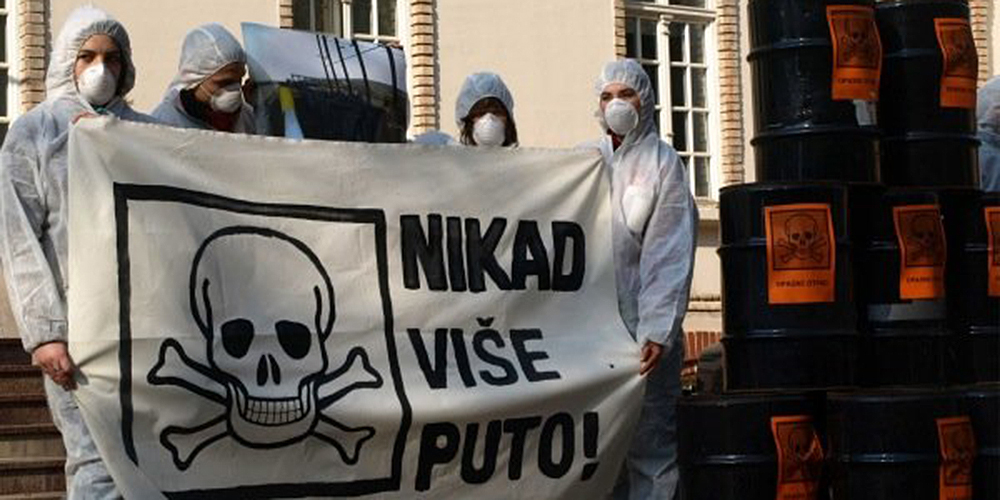Zagreb municipal solid waste incinerator, Croatia
Zagreb City Council is planning to build a 385 000 tonnes-per-year waste-to-energy plant, for which the official cost estimate is EUR 161 400 000. The plant would burn municipal waste and sewage sludge. Croatian environmental NGO Green Action, along with local residents’ groups, believes that the incinerator plans are premature and dangerous.
This is an archived project. The information here may be out of date.
Learn more about our current projects and sign up for the latest updates.

Stay informed
We closely follow international public finance and bring critical updates from the ground.
Background
Success: EBRD and EIB funding cancelled
The EBRD and EIB were both considering supporting the incinerator. After protests by Green Action, both banks eventually indicated that they were no longer interested, and the Zagreb city council admitted that the project was delayed. It instead intended to use EU funds to finance the project.
Main concerns
Briefly, Green Action’s concerns are as follows:
- The incinerator would produce around 100 000 tonnes of ash and filter residue per year, much of which is hazardous, containing dioxins and heavy metals. However, Croatia has no facilities for safely storing, treating or disposing of hazardous waste, and it is estimated that around half of Croatia’s hazardous waste is currently missing, so it is of great concern that plans are being developed to create more toxic waste with no proper solutions. In addition, the landfill where the less toxic bottom ash should be stored is due to be closed in 2011, with no replacement site confirmed.
- Recycling of municipal solid waste is currently at a low level in Zagreb, and much more should be done to prevent and recycle waste before investing in expensive disposal solutions. Without any public consultation, the City of Zagreb approved a new waste management plan in March 2006, which allocated EUR 161.4 m for incineration and a pathetic EUR 4.5 m for recycling, with nothing at all allocated for waste prevention measures.
- The incinerator would increase air pollution in Zagreb. Although it is predicted that all emissions will be well within the legal limits, the previous experience with Zagreb’s disastrous PUTO hazardous waste incinerator, which eventually burned down, suggests that the Croatian authorities do not have the capacity or will to carry out regular monitoring and punish violations.
- Waste-to-energy is presented as an efficient method of utilising waste products, but it would be much more energy efficient to invest in waste prevention and non-toxic recycling instead of burning re-usable materials.
The first and second Environmental Impact Assessments for the project were rejected but after the EIA review commission was changed and the 2nd EIA was amended, it was approved with no new public consultation. Since there is no provision for such fast-track procedures in the Croatian EIA regulation, Green Action believes that the approval is illegal and is taking legal action against the decision.
Green Action is calling for a new city Waste Management Strategy to be developed with a maximum level of public participation, and for waste prevention measures and door-to-door recycling collections and for alternative solutions for residual waste such as Mechanical-Biological Treatment to be properly examined. More detailed information can be found in Green Action’s outline of its concerns with the project and also in the issue paper, Zagreb solid waste municipal incinerator: an unsuitable quick-fix for Zagreb’s waste problems.
Latest news
Zagreb Mayor arrested – and not before time
Blog entry | 20 October, 2014Something quite amazing happened yesterday evening in Zagreb. The Croatian police and the State Prosecutor announced that several people had been arrested on suspicion of a number of criminal corruption offences, abuse of office and peddling influence. Among the arrested were Zagreb Mayor Milan Bandic, Head of Zagreb Holding municipal company Slobodan Ljubicic, the head of the ZET public transport company Ivan Tolic, head and part-owner of the CIOS metal recycling company Petar Pripuza and around 15 more un-named people.
Read moreCity of Zagreb still playing with fire
Blog entry | 18 July, 2014Seasoned Bankwatch-watchers may recall our successful four-year campaign to stop the EBRD from financing a waste incinerator just outside Zagreb. Between 2005 and 2008, we supported Zelena akcija/Friends of the Earth Croatia and local group UZOR to prevent the City of Zagreb from building a huge 385 000 tonnes per year waste incinerator in Resnik on the outskirts of Croatia’s capital.
Read moreRelated publications
Zagreb solid waste municipal incinerator: an unsuitable quick-fix for Zagreb’s waste problems
Briefing | 19 May, 2007 | Download PDFLetter to EC representatives on breaches of law in Zagreb incinerator EIA approval
Advocacy letter | 31 October, 2006 | Download PDFOn November 24, 2006 Francois Delcuellerie, EC Desk Officer for Croatia answered to this letter. Download the response as pdf here. On September 3, 2007 Marijan Galovic of Green Action sent update to the originall letter. Download it as pdf here. On January 28, 2008 Croatian Ministry of Environment responded to the above. Download the letter as pdf here.
